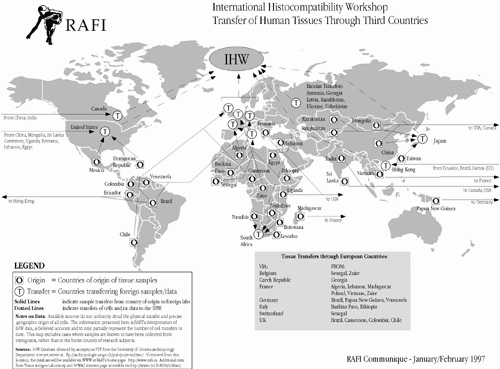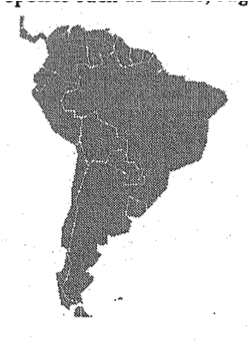RAFI's study of 118 Plant Breeders' Rights claims exposes a predatory pattern of biopiracy supported by UPOV and by national legislation in several OECD countries, especially Australia.
Briefings
UPOV Buries it Head; PBR Moratorium Page
The Life Industry 1997: The Global Enterprises that Dominate Commercial Agric., Food, and Health in 1997 - an overview
The global enterprises that dominate commercial agriculture, food and health
In 1997, for the first time in history, global mergers and acquisitions topped 1 trillion dollars - almost 10 times the value of all takeovers at the outset of this decade. UNCTAD revealed that 79% of all foreign direct investment to the South is now in the form of corporate acquisitions and a parallel US government report advises that 40-45% of all manufacturing sales are between subsidiary and parent multinationals. 1 The multilateral agreement on investment (MAI) currently being negotiated by industrialized countries behind closed doors, if adopted, could be the final blow to national sovereignty and signal the de facto ascendancy of transnational enterprises to the political control of the world's economy. During 1997, the life industry was also active in consolidating its power over the world's biological resources...
*The world's top 10 agrochemical corporations accounted for 82% of the global agrochemical sales in 1996. Sales reached US $30.5 billion last year, up more than 15% since 1994.
*The top 10 seed corporations control approximately 40% of the commercial seed market, valued at approximately (US) $15 billion.
*The world pharmaceutical market is an estimated $251 billion; the top 10 enterprises control approximately 36% of the global market. The top 20 drug companies control 57%.
*By the end of 1997, the top 10 veterinary medicine corporations are expected to hold 63% of the total worldwide market.
HGDP Rejected
The life industry and US government are using bilateral bioprospecting agreements as their tool of choice to cheaply access genetic resources and undervalue farmers' resources and knowledge. These bilaterial agreements actually encourage inequities through patents, secrecy, and imbalanced negotiations that favour companies, not the true innovators and sustainable users of diversity, farmers and indigenous people.
The world's largest and most influential international agricultural research network, the Consultative Group on International Agricultural Research (CGIAR), is conducting its first full systemwide review in 17 years. In May, 1998 in Brayil, a prestigious review panel led by Maurice Strong will table its recommendations for the future of the network, which launched the Green Revolution.
Critical Crops; Patent Claims on Cloning
Will governments opt for a multilateral system of crop germplasm exchange or will they determine to pursue bilateral agreements between countries and companies? RAFI examines Africa's bargaining position, and concludes that bilateral negotiations over crop germplasm will benefit the North, at the expense of food security in the South.
Gene Licensing Agreements; Precision Farming
Two trends in industrial agriculture are contributing to the erosion of farmers' rights and lead to bioserfdom: 1) Monsanto's 1996 gene licensing agreement; 2) "Precision farming" and the role it plays in the commodification of information technology and the growing influence of the life industry in farm-level decision-making.

This map illustrates the transfer of human tissues through third countries. This graphic is part of the Communique on Human Tissue Trade.
The Global Traffic and Market in Human Biomaterials
Despite the promise of medical breakthroughs, the utilization of human tissue prompts intense ethical concerns regarding ownership of human biomaterials, eugenics, discrimination and medical confidentiality. A large and growing South to North and North to North movement of human tissue is taking place in an almost total policy and regulatory vacuum.

Bolivian Quinoa Claimed in US Patents
"Biopiracy" -- a term coined by RAFI in 1994 - refers to the use of intellectual property laws to gain exclusive monopoly control over genetic resources that are based on the knowledge and innovation of farmers and indigenous peoples. This issue examines a patent claim on Bolivian quinoa, a US patent on turmeric, and more.
